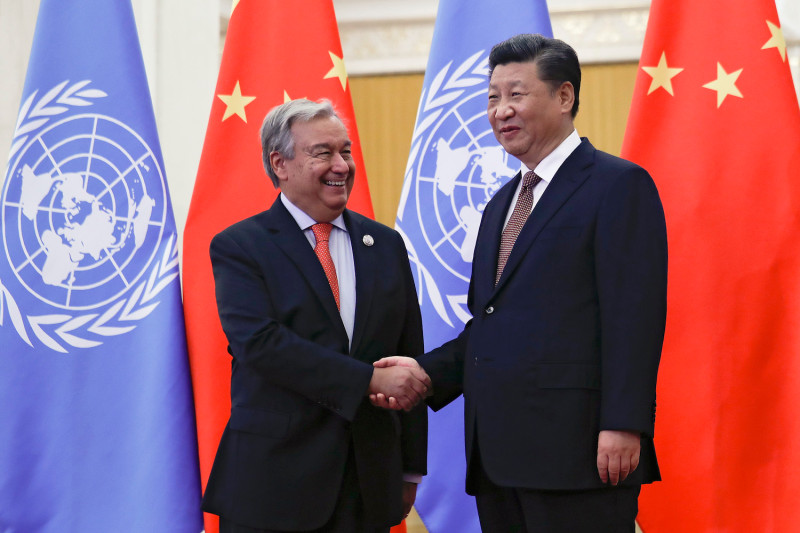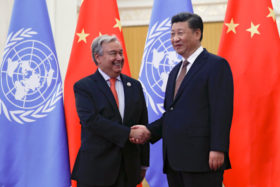U.N. Backs Down on Partnership With Chinese Firm for 75th Anniversary
 BEIJING, CHINA – SEPTEMBER 2: United Nations Secretary General Antonio Guterres, left, shakes hands with Chinese President Xi Jinping before proceed to their bilateral meeting at the Great Hall of the People on September 2, 2018 in Bejing, China. (Photo by Andy Wong-Pool/Getty Images)
BEIJING, CHINA – SEPTEMBER 2: United Nations Secretary General Antonio Guterres, left, shakes hands with Chinese President Xi Jinping before proceed to their bilateral meeting at the Great Hall of the People on September 2, 2018 in Bejing, China. (Photo by Andy Wong-Pool/Getty Images)
Foreign Policy, 15 April 2020

Below is an article published by Foreign Policy, Photo REUTERS/Thomas Peter/File Photo.
“Tencent is honored to participate and facilitate UN75 global conversations,” Martin Lau, the president of Tencent, said in a subsequent April 1 press release announcing the partnership, before the U.N. backtracked. “We will spare no effort in providing technical solutions to support online meetings and idea exchanges for the UN, with the aim of bringing the global village even close together and overcoming global threats through extensive dialogue and cooperation.”
But U.N. officials began having second thoughts following swift public criticism and behind-the-scenes queries from congressional staff and other U.S. officials.
“Considering one of the partnership’s goals is to discuss the future we want to see, what happens when people discuss these sensitive topics on a Tencent platform? Will they be censored? What happens to people saying these things if they are in China?” Michael Caster, a human rights advocate and co-founder of Safeguard Defenders, an organization that monitors human rights in China, asked in an op-ed for Nikkei Asian Review.
Tencent did not respond to an emailed request for comment.
U.N. officials privately acknowledged that the announcement was made in haste and that the organization is undertaking a review of its relationship with Tencent to determine whether it can address the concerns of its critics. But they insisted that Tencent was only one of a number of international tech companies, including Twitter, Facebook, Google, and Kahoot, that the U.N. has reached out to to participate in the 75th anniversary event.
One U.N. official said the organization is now consulting internally to see whether the criticism from human rights groups about the need for data privacy and data anonymity can be addressed in “a possible agreement to ensure adequate safeguards are put in place. But no agreement has been concluded.”
The latest controversy comes as the United States wages a diplomatic battle against another Chinese tech company, Huawei, as it seeks to build up foreign countries’ 5G telecommunications infrastructure. Both cases reflect how fraught relations between Washington and Beijing are, particularly as top U.S. leaders and lawmakers blame their Chinese counterparts for mishandling the country’s coronavirus outbreak that led to the global pandemic.
The U.N. collaboration raised questions as to whether Tencent’s so-called “moderation rules”—its policy regarding what speech will be censored on its platforms—would apply to the U.N. dialogue and whether such rules would limit the ability of Chinese netizens to participate without fear of reprisals, according to David Kaye, the U.N. special rapporteur on the promotion and protection of the right to freedom of opinion and expression—an independent expert.
“There is a broader question of whether the United Nations should collaborate with companies that have serious restrictions on the nature of public debate allowed on their platforms,” he said.
Many other communication platforms, such as Twitter and Facebook, are banned in China—potentially limiting the United Nations’ options in picking a platform to stream its meetings worldwide.
In internal U.N. communications obtained by Foreign Policy justifying the organization’s partnership with Tencent, a U.N. official said a global survey for the 75th anniversary, publicly available on its website, was “not readily accessible in China.”
“As such, Tencent has offered to help create an online platform in China to help disseminate the survey to people in China,” the official wrote. “Survey responses will also be treated with the same data and anonymity protection that we afford through our one-minute UN75 survey elsewhere.”
Several U.S. congressional Democratic and Republican staffers tracking the issue highlighted the irony in this: Chinese censorship guards likely prevented access for its citizens to a U.N. survey, so the U.N. enlisted the help of a Chinese company abetting that censorship to disseminate the survey.
“That raises a lot of concerns if [the U.N. is] making a decision to reach a global audience. The only companies you can choose are the Chinese ones because the Chinese are prohibiting Western companies from actually operating there,” one Republican congressional staffer said.
The U.N. is seeking to solicit views from ordinary individuals, think tank experts, and other members of civil society to present to world leaders assembled at the United Nations in September.
The 75th anniversary committee has received just more than $7.6 million in total funding, including more than $3 million in contributions from China, Germany, France, Iceland, Ireland, Portugal, the Netherlands, Turkey, Sri Lanka, South Korea, Sweden, Switzerland, and the United Arab Emirates.
A group of American and European foundations, including the Bill & Melinda Gates Foundation, the Ford Foundation, the Open Society Foundations, and the United Nations Foundation, contributed nearly $4.5 million. The Chinese government contributed about $300,000, while the United States, which has protested Beijing’s growing influence at the United Nations, contributed nothing.

